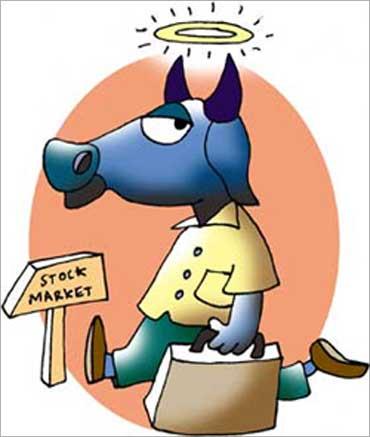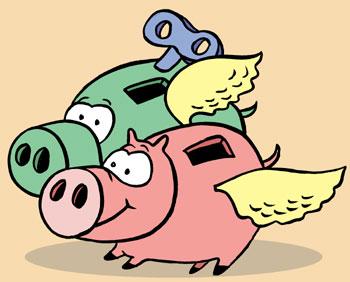
Here's how you can be on top of your stock market strategy and make money
Traditional concepts of finance are built upon the idea of efficient markets. In that world, investors are (supposedly) rational, unbiased, logical, and risk-averse.
When investors act in accord with these qualities, a stock's price equals its value, and no trading strategy should beat the market.
But those of us who invested in the stock market during the various stock market bubbles suspect that might not always be the case.
We're consistently irrational
For decades, psychologists have been studying human decision-making and discovered that we are systematically irrational.
We tend to consistently act in an irrational manner in certain situations and when making certain decisions. When this discovery was later applied to investing, the field of behavioural finance was born.
Though this field of study has been around for some time, it gained fresh attention following the technology bubble bust in 2001.
Investors and economists looking for an explanation for the bubble latched on to many of the tenets of behavioural finance.

Princeton University psychology professor Daniel Kahneman, a pioneer in the field of behavioural finance, won a Nobel Prize for Economics in 2002. His work merging psychology and economics led to the development of a more nuanced understanding of how stocks perform.
Behavioural finance shows that investors are, in reality, emotional, biased, overconfident, and myopic, with a distorted concept of their needs.
And this behaviour (when practiced en masse) sometimes creates bubbles (technology, real estate) and seasonal swings (such as the so-called January effect, which predicts that stocks rise during that month).
Some investors have been able to profit from investor misbehaviour. Legends such as Warren Buffett and George Soros have consistently outperformed the market.
But unless you're a legendary investor, recognising and correcting these four most-common behavioural mistakes can help you make and keep more money.

1. Emotion trumps rational judgment
People hate to lose more than they like to win. This fear of regret causes investors to hold on to losers too long and sell winners too early.
Investors tend to hold on to losing investments hoping that they will come back.
The contrary is true with winning stocks.
Fearing a downturn and wanting to lock in profits, investors will sell stocks or funds too early and miss out on future gains.

2. Investors tend to get overconfident
The majority of people think they are better than average at a variety of tasks, such as driving and investing.
But by definition, a majority of people can't be above average.
This unrealistic assessment of one's own investing prowess causes investors to overtrade and pay the resulting higher fees and taxes.

3. Myopia causes misallocation
Investors tend to view each investment in isolation rather than in aggregate.
Trying to make every investment a winner can throw off the asset allocation. It can also lead an investor to chase hot stocks, trade excessively, and sell at the wrong time.
If all of an investor's individual investments are up at the same time, they should be alarmed rather than proud.
It's a sign that they may be under-diversified and taking on too much risk.

4. Aversion to saving
A few years back, in the United States, Professors Richard Thaler of the University of Chicago and Shlomo Benartzi of UCLA developed a behavioural finance programme called Save More Tomorrow, or SMarT.
Under the SMarT program, workers allowed automatic deferral increases to their retirement plans each year at raise time. In a test run at one company, 78 per cent of those who were offered the plan joined, and 80 per cent of those stayed in the programme.
Even more striking, the average savings rates for people in the SMarT program climbed from 3.5 per cent to 13.6 per cent in fewer than four years. So when workers didn't see the decrease in their paychecks, they didn't miss the money.

Using the information
Simply recognising bad behaviour can lead to success. Use online tools such as portfolio managers that can help identify unintended areas of concentration in your portfolio and avoid overlap amongst your fund and stock holdings.
Develop a trading strategy and stick with it to take emotion out of the equation. Or, better yet, take a long-term approach to your investments and don't look at them more than once or twice a year.
Remember that most people have average investing skills, so buy and hold a diversified portfolio of investments and control what you can. You can't control the returns from your investments, but you can affect the amount you pay in fees and taxes.
Don't look at your investments individually, but rather take your portfolio as a whole. Portfolio manager tools can help you organise and categorise your investments. Or consult a financial planner.
And finally, consistently put money away for retirement. The best thing you can do for your portfolio is give it time to grow.